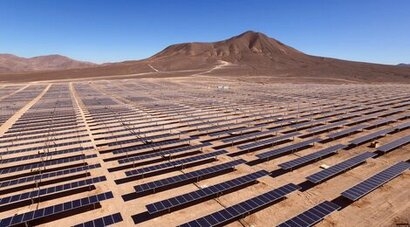
The projects will supply electricity to the towns of Moundou and Doba in Southern Chad and the capital city, N’Djamena, along with the Doba Oil Project. A signing ceremony was held last Friday (27th May) in N’Djamena, attended by His Excellency Djerassem le Bemadjiel, the Minister of Petroleum and Energy of the Republic of Chad, His Excellency Mark Matthews, Ambassador of the United Kingdom to the Republic of Chad, Sarah Wilson, Deputy Head of Mission at the British Embassy N’Djamena, Chad, and Andrew Knott, Chief Executive Officer of Savannah.
The first Project Savannah has agreed to develop comprises an up to 300 MW photovoltaic solar farm and battery energy storage system (BESS) located in Komé, Southern Chad (Centrale Solaire de Komé). The project will displace existing hydrocarbon power supply resulting in a significant reduction in CO2 emissions and provide a supply of clean, reliable electricity on a potential 24/7 basis to the surrounding towns of Moundou and Doba (which currently only have intermittent power access).
The expected tariff for the electricity generated from this Project is expected to be significantly less than that being paid for the current hydrocarbon-based power generation in the region. At 300 MW, the Centrale Solaire de Komé would be the largest solar project in sub-Saharan Africa (excluding South Africa) as well as constituting the largest battery storage project in Africa. Project sanction for the Centrale Solaire de Komé is expected in 2023 with first power in 2025.
The second project covered by the Agreement involves the development of solar and wind projects of up to 100 MW each to supply power to the country’s capital city, N’Djamena (the Centrales d’Energie Renouvelable de N’Djamena). A significant portion of this project is anticipated to benefit from the installation of a BESS, potentially enabling the provision of 24/7 power supply.
At up to 200 MW, the Centrales d’Energie Renouvelable de N’Djamena would more than double the existing installed generation capacity supplying the city and increase total installed grid-connected power generation capacity in Chad by an estimated 63 percent. Savannah expects the cost of power from the Centrales d’Energie Renouvelable de N’Djamena to be lower than existing competing power projects, which are currently primarily hydrocarbon-based. Project sanction for the Centrales d’Energie Renouvelable de N’Djamena is expected in 2023/24 with first power in 2025/26.
Savannah expects to fund the Projects from a combination of its own internally generated cashflows and project specific debt.
“We are delighted to work with Savannah on these two potentially transformational power projects for Chad” said His Excellency Djerassem le Bemadjiel, the Minister of Petroleum and Energy of the Republic of Chad. “Our country is blessed with a significant renewable energy resource and we are excited that a leading British company such as Savannah is seeking to harness this resource to provide utility scale power to our country. I warmly welcome the projects and Savannah’s entry into the Chadian power sector. We are already engaged to provide all the support needed for implementing these projects and having the first power delivered to our population and our industries in line with the State plan for enhancing the power offering in our country.”
For additional information:

